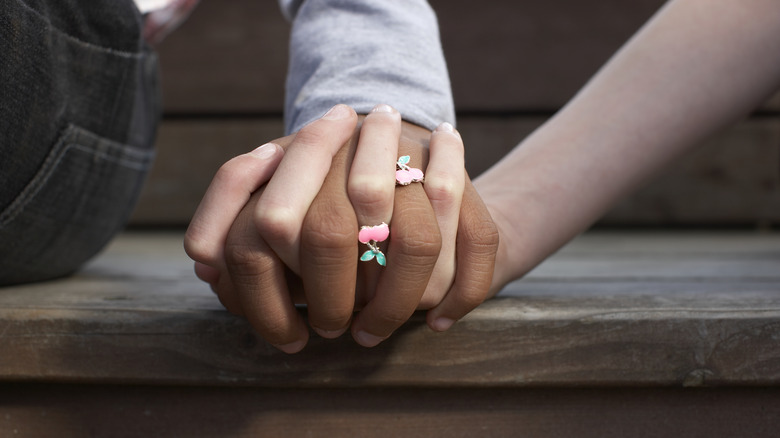Signs You Might Be With The 'Right Person, Wrong Time'
In your dating life, you might have come across some situations where everything is perfect except for one crucial factor that is totally out of your control. This situation might have left you wondering if things would have worked out better if you had met them while in a different phase of life. Well, chances are that you have come across a "right person, wrong time." Psychologist Cynthia King, founder of FemFwd, believes that certain people are meant for certain phases of our life.
"Right person, wrong time is such a heart-wrenching situation, but perhaps this situation serves a purpose," she told The List. Sometimes, this purpose could be to reassure you that people with the qualities you desire do exist. "This inspires some hope and trust in the dating process."
Oftentimes, we mistake the "right person, wrong time" scenario and use it to tag what might have been just the "wrong person, wrong time." Knowing who your "right person, wrong time" is could be a cathartic way of confirming the benefits you are looking for from a relationship and the boundaries you deem necessary. We sat down with King and Ruchi Ruuh, licensed therapists and relationship counselors, to bring you the telltale signs of being with the "right person, wrong time." Maybe you can cross-check the symptoms we have detailed with your lived experiences and find your version of "the one that got away."
Who is a 'right person, wrong time'?
Before we get into the signs that you are in fact with your "right person, wrong time," it is crucial to know who your "right person" is. The right person will always be someone you feel absolutely comfortable being with. They should be someone that shows you all the green flags about the kind of relationship you are looking for.
"The right person is someone who stays consistent, respects the boundaries, and is trustworthy, sexually and emotionally," Ruuh explained to us. The right person is someone that you can be truly authentic with. There is mutual respect, gentleness, and concern for one another's overall well-being. "There is usually an overlapping value system and a genuine curiosity to learn more about the other person," King said.
Ruuh provided us with some sample scenarios that might reflect a "right person, wrong time" situation. Let's say you happen to meet someone who fulfills all your needs, wants, and desires from a romantic relationship, but this happens during a super short work trip with the possibility of never meeting the person again, if not for your wanting to be with them. Now, that is a "right person, wrong time" situation because even though they are the absolute form of your ideal partner, the logistics of it can complicate the relationship and end up in heartbreak.
Sign #1: The logistics are not on your side
The earlier-mentioned scenario is a classic example of how the complexities of figuring out the logistics of a relationship can be incredibly stressful. Logistical issues can have a big impact on relationships. Logistical issues include things like being in a long-distance relationship where partners are in different time zones or issues like working different shifts, making it hard to see each other. The impact of these challenges can be quite negative. It can affect the amount of time you are able to spend with one another.
"Quality time is a really important factor in a relationship because shared experiences help people get to know one another and help to build trust," King told The List. Without quality time spent together, it can be incredibly difficult to lay the solid foundation that is essential for a happy and healthy long-term relationship.
Logistical issues can also make it hard to feel like a priority in each other's life. Additionally, logistical issues add stress to the relationship because it's just another hurdle. "While these challenges can be overcome through good communication and stick-to-it-iveness, they can be a real barrier in relationships," King said.
Sign #2: They are emotionally unavailable
Relationships are built on a foundation of emotional intimacy. Emotional intimacy relies on the ability to be vulnerable and the safe space to express your innermost thoughts, feelings, and beliefs. The other side of that process is the ability to receive and be attentive to your partner's emotional experience. When a person is emotionally unavailable, it prevents the development of that strong foundation without which a long-lasting relationship cannot be maintained.
According to Ruuh, if one partner is emotionally unavailable, either the other partner loses interest or starts making ostentatious amounts of effort to win their love, depending on their attachment style. "Our relationships are mutual spaces to fulfill our needs and desires. If these needs are not fulfilled you'll end up feeling dissatisfied," she told The List.
The constant mixed signals, inconsistency, and non-reciprocation will leave you feeling rejected and unimportant. It can be especially bad for your mental well-being in the long term as you may be tempted to keep trying to climb the wall of unavailability without much success. "Without emotional intimacy, relationships break faster than expected, along with breaking the spirit of the emotionally healthy person," Ruuh warned.
Sign #3: Your life goals aren't compatible
Even though love is a non-bargainable vector in any relationship, the sad truth is that love isn't enough to make a relationship work. To make a relationship as successful and happy in real life as it looks in your imagination, a ton of practical factors have to align for you. Misalignment of long-term goals is one of the many practical reasons a relationship might not work. According to King, "While we compromise some of what we want in relationships, it's important to continue to live a value-driven life that also matches what you need and want."
By long-term goals, we mean your vision. Where do you see yourself in the next five years? What about the next decade? If one has different goals from another, like moving out of the country, never wanting to marry, or never wanting to have children, we have a classic case of misalignment of long-term goals.
"Sure, one partner can compromise on their long-term goals and plan to stick around because all other aspects of the relationship are good, but that means giving up dreams, aspirations, and a chance for personal growth," Ruuh told us. Such sacrifices may seem harmless in the beginning but they can wreak havoc in the long run, causing resentment, low self-esteem, and dissatisfaction. "It is all right if both people are ready to come to a mutual compromise, but it's not right for one person to give up completely."
Sign #4: One of you just got out of an intense relationship
Breakups are hard. We not only lose a partner but also a part of us, our present and future with them. When life throws difficult losses at us, it's always important to allow ourselves to grieve. Grief can be a great teacher if we allow it to be. It is extremely important to take some time after a breakup and use it as an opportunity to heal and work on your own negative patterns. Lots of people try to fill this void with casual sex. People who keep jumping from one relationship to another carry the residue of resentment, anger, and unhealed trauma from one partner to another, thus making the same choices and creating similar problems and resolutions.
While jumping into another relationship may help you cope with the grief of losing your previous relationship, taking a break gives you the opportunity to feel all your feelings. Additionally, it might teach you a thing or two about the patterns you may not want to repeat in your next relationship.
"The break we take after a breakup is an act of kindness toward yourself. Because you are giving yourself the time to feel and grieve the loss, and your future partners, because you are giving them the chance to meet a more healed version of you," Ruuh told us.
Sign #5: One of you is not looking for a relationship
Meeting the right person when neither of you is looking to be in a relationship can be a quite heartbreaking experience. According to King, this is one of the scenarios where you have to be honest with yourself about what the "right time" is for you. This helps you to determine if you are just being fearful of a relationship or aren't flexible enough with your timing.
Now, if either of you determines that it is not the right time, then King encourages you to mourn the loss of what could have been.
"You might even communicate this to them and agree to stay in touch every once in a while because the timing could and sometimes does line up later in life. You might also adhere to the belief that what's meant to be will be, even if it's not on our timing," she said, providing us with a framework to deal with the situation.
Sign #6: One of you is currently soul-searching
You don't want us to tell you that soul-searching is a very important part of being able to thrive as individuals. Being in sync with yourself and knowing yourself better doesn't just make your relationship with yourself better, it also improves the quality of the other relationships you are involved in.
"We are not perfect beings who are given a manual for a perfect relationship. We learn through the modeled behavior of our caregivers, friends, and lovers. So many of our ways of dealing with the world are not original creations but learned behaviors, and many times they do not work for us," Ruuh said.
Most adults keep replaying the same scripts that they enacted with their parents as a child. As we develop a personality and start understanding ourselves better, we can understand our needs and desires. A self-aware person has higher self-esteem, empathy, confidence, and clarity, for self and others. Working on your self-awareness helps you make better choices in partners and the kind of relationships you want in your life. Additionally, you will be able to navigate those relationships better without giving up your own values or asking others to give up theirs.
Sign #7: They are already involved with someone
This is a heartbreaking scenario we have seen happen in film and TV. We have all passionately waited for our favorite characters to break up with their partners so the ones we ship can finally get together. Unlike Jim and Pam from "The Office" or Rachel and Mike from "Suits," in real life, the third party involved here is often not a complete punk!
If you find yourself in this situation, Ruuh advises you to start by asking yourself some fundamental questions that will give you the answers to how to move forward with this connection. Why do you think they are right for you? Have they expressed their interest in a relationship with you? Does it align with your values to explore this possibility?
Ruuh also says that it is important to understand that just because you see the right person in them does not guarantee that they do the same. "Having a clear conversation about your feelings might help. Just make sure that they have expressed their interest too and you are not stepping in their boundaries. True desire can't be negotiated, so be with someone who chooses you," she said.
Sign #8: You have a gut feeling that this is not for you
While following your gut is the answer to almost every pressing situation in life, when it comes to relationships, it is important to distinguish your gut feeling from coping mechanisms that might have developed due to unfortunate dating experiences from the past.
"I'm a big fan of following your intuition, though you need to be able to clearly distinguish intuition from fear. A lot of times people have had such bad relationship experiences that their 'gut' instinct is not accurate," said King.
Previous experience leads us to assume a lot of negative things. Predicting things won't work out when you have this anxiety surrounding dating and relationships. This is also one of the ways soul-searching can help you. When you have dealt with your unprocessed emotions and carefully compartmentalized them, your gut feeling becomes more accurate. This is because a healed person can make informed decisions that consider every aspect of a situation and not act from a framework of denial, trust issues, or even the fear of rejection.
What not to do? Don't try to make it work anyway!
A situation like this can work only if all the partners involved are aware of the effort that would be required in such a relationship and are in agreement about the number of sacrifices and compromises each partner is willing to make. Even in this case, King encourages both parties to be in agreement that it's fine to change their mind about forging ahead.
The problem with a "right person, wrong time" situation is that sometimes we are so into this one person that we overvalue them. In situations like this, Ruuh advises you to stay true to yourself. "Don't try to change your personality, city, or interests just because you see the value in someone. These changes will be temporary, and you'll soon be yourself again and feel bad for making those changes."
At the end of the day, it is important to remember that being with the "right person, wrong time" is just being with the wrong person for you.










